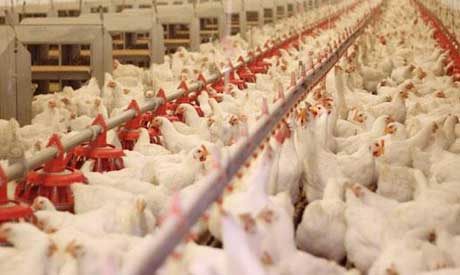
File photo: A poultry farm in Egypt (Photo: Al-Ahram)
Egypt's agriculture ministry says it will put into effect a 2009 law banning the trade of live poultry in a bid to improve poultry production, combat environmental pollution and prevent the spread of diseases like bird flu.
The law bans the slaughtering of poultry outside unlicensed slaughterhouses. It stipulates that live poultry should be transported directly to licensed slaughterhouses after traders acquire special authorisations following veterinary inspection, before the refrigerated or frozen food products are offered at shops.
Although the law was in effect in 2009 and 2010, it has not been enforced since.
As a first phase, the ministry will ban the trading of live poultry in the capital Cairo and the neighbouring city of Giza, which consume 30 percent of the country's poultry, according to Mona Mehrez, deputy agriculture minister for livestock and poultry production.
The ministry will later expand the ban to Egypt's second city of Alexandria and the capitals of governorates, Mehrez said in TV statement on Tuesday.
According to the deputy minister, Egypt has a sufficient number of slaughterhouses, which currently operate at only 10 percent of their total capacity.
The new system will offer soft loans to owners of shops where poultry is slaughtered so they can shift their business to offering refrigerated and frozen poultry products. The loans will be provided by the trade ministry's Medium, Small and Micro-sized Enterprises Development Agency.
Mehrez stressed that the legislation will help Egypt eliminate bird flu, which she says is primarily caused by the unregulated slaughtering and transport of poultry without necessary veterinary examination.
The scheme will also offer additional benefits by cooking poultry waste at warehouses to produce fodder and fertilisers, Mehrez said.
Short link: